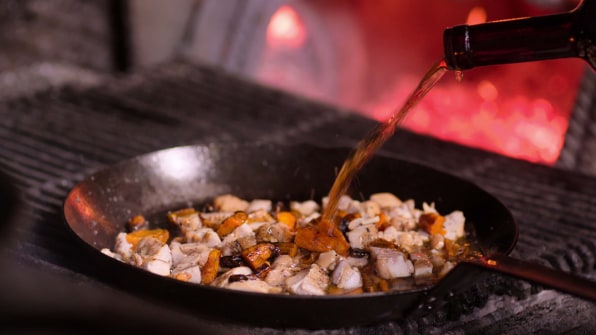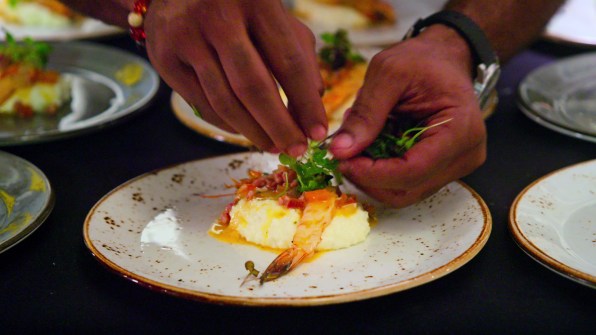Racing Shows On Netflix
Terroir is a French word that roughly translates to "taste of place." It gets tossed around in the wine world to describe specific geothermal conditions that account for why certain grapes taste just so. Of course, terroir also works the other way. Environment and behavior have an impact on the foods they produce, and foods have an impact on the environments and behavior of those that enjoy them.
Considering that Netflix's new series High on the Hog traces the origins of a cuisine, it makes sense for the host to be a sommelier, an expert on terroir. But since the cuisine in this case is American, and its origins involve centuries of exploiting people and culture taken from Africa, it helps that Stephen Satterfield is a sommelier and also much more.
"I've always found food and wine to be such an effective way to get people to think more critically about the world around them," says Satterfield, founder of the food publication Whetstone and a chef in his own right. "We could virtually piece together any component of human history in analyzing our diet or our foodways, and doing so gives us permission to talk about subjects that otherwise feel difficult, cumbersome, challenging, or taboo even."
High on the Hog, which streams on Netflix starting May 26, traffics in exclusively those kinds of subjects. Viewers will get the difference between sweet potatoes and yams, sure, but they'll get way more about how the enslavers of Africans took not only people from the land, but indigenous foods, passed-down recipes and cooking ingenuity. The kind of thing most food shows shy away from.
"It is impossible to have certain conversations on food and agriculture without a racialized perspective coming into it," Satterfield says, "because the foundational relationship between Black Americans and the United States of America is one of subjugated labor for the purposes of growing the agricultural sphere here—first with rice, and then ultimately tobacco and beyond."
Based on acclaimed food author Jessica B. Harris' 2011 book, High on the Hog: A Culinary Journey from Africa to America, the show plays at times like a culinary 1619 Project, while also swinging between NC-17 food porn, chummy chat show, and transcendental communion. Harris makes appearances herself, but ultimately the series is framed as the personal journey of its host.
Satterfield first became interested in the anthropological origins of recipes while working as a sommelier for more than a decade. By learning to engage with wine from a terroir perspective, he began looking at all kinds of food through a similar lens—and was often fascinated by what he saw.

He walked away from the sommelier business in 2007 because he found it too homogenous, sloshing in a red sea of white males, and too focused around a seemingly endless exam process. He didn't leave the wine world behind entirely, however. Instead, he started a nonprofit working with Black farmers and winemakers from the Western Cape of South Africa, whom he met while working as a somm, and whose history stuck with him.
"I really felt a kinship to their story about the origins of the South African wine industry through Dutch colonization," the host says. "And also, I saw over 90% of the workforce were Black and brown South Africans who owned less than 1% of the industry. These were not things that we were learning in our wine curriculum."
The disconnect between wine industry canon and the greater historical landscape of fermented grapes inspired him to help tell more food origin stories. He'd already developed an ability to communicate complex agrarian narratives—talking about certain wines inevitably led him to bring up apartheid and Nelson Mandela—and so he channeled his skills into creating a print magazine dedicated to culinary origins and culture. It was his way to share more perspectives too often missing from traditional food media.
It also put him on the radar of the producers behind a new Netflix series.

Satterfield was not aware until far along in the interview process that he was actually being recruited to host High on the Hog. At first, he thought he'd just be using his knowledge and connections to help curate elements of the show. It was only during the third time meeting with producer Fabienne Toback, when she asked if he was ready for audiences to see and know him, that he realized what was happening. It was a dream come true, but he would only accept the honor on the condition he get the personal approval of Jessica B. Harris, whose groundbreaking work Satterfield started idolizing at an early age. (She approved immediately.)
Beyond Satterfield's expertise and show-aligned interests, he makes for an ideal host with his magnetic warmth, searching eyes, and palpable empathy. His casual interview style during gatherings keeps conversation flowing and allows breathing room for authentic experiences to emerge in. He and his guests turn a variety of spaces into convivial atmospheres where, despite the often-heavy conversation, everyone watching might feel welcome to pull up a seat.
And Satterfield, who vividly remembers the shows he watched on Food Network growing up, is very interested in who is watching High on the Hog.
"My mind goes toward all the young Black children, especially all over the world, who will watch this and see their likeness reflected in the series," he says. "Who knows the ways in which they will continue not only to preserve but advance a lot of the food and cultural traditions that we present on the show."
Source: https://www.fastcompany.com/90640029/netflix-high-on-the-hog-offers-food-for-thought-race-america

0 komentar:
Posting Komentar